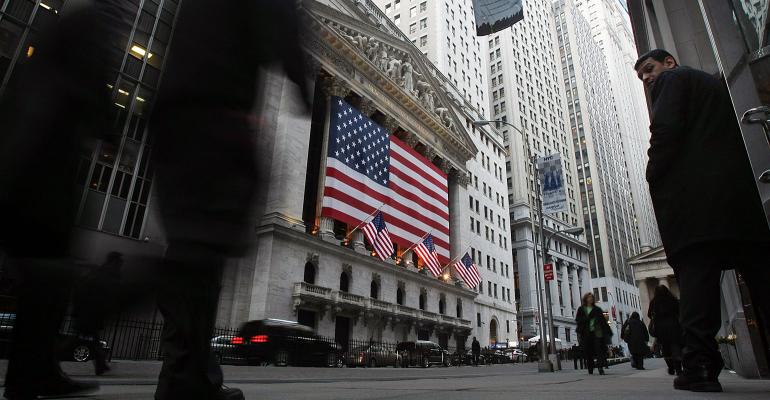Market mayhem this month has re-ignited fears about how the $4 trillion U.S. ETF industry will react in a liquidity crunch. Europe may have an answer for averting disaster.
The nightmare scenario: volatility prompts market-makers to withdraw when they’re needed most, blowing out transaction costs and freezing trading. It’s an outcome that’s been raised by the likes of Moody’s Investors Service Inc. and T. Rowe Price Group Inc. this year as late-cycle swings convulse markets.
Some see a potential cure in a practice that’s commonplace from Italy to the U.K. but banned in America: ETF providers paying market-makers directly. The argument goes that conflict-of-interest concerns are misplaced -- and that traders under contract to keep transacting in passive instruments will do so come hell or high water.
While U.S. regulators are keeping mum on the issue, it’ll likely be a hot topic at industry conferences heading into year-end, said GTS’s Reggie Browne, who supports a “modernization” of ETF market-making rules.
“Particularly in times of stress and at the end of cycle, you never know what’s going to happen, and you want all participants to be active in the marketplace,’’ said the principal at the trading giant.
Increasingly fragile investor sentiment this summer is sparking ever-more extreme swings, with August registering a blinding Treasury rally, stock reversals rarely seen in this multi-decade bear run and a historic sell-off in some emerging-market bonds. ETFs are particularly vulnerable to sudden shifts in sentiment since they’re bought and sold throughout the day.
Paying market-makers directly would help ensure they remain committed to providing competitive quotes even if markets become roiled, some argue. Smaller products that are neglected by these traders under the current regime would stand to benefit the most, according to Louis Odette, a strategist at Citigroup Inc.
That’s because under current rules market-makers, who help to keep an ETF’s price in line with its underlying value, are compensated by exchanges according to trading volumes, leaving smaller funds vulnerable to being shunned when it becomes uneconomical to support them.
“If there’s market turmoil, the market-maker is more likely to step away if they don’t have a commercial obligation,” said Hector McNeil, co-founder of ETF platform HANetf in London and a 20-year industry veteran. “Market-making agreements create a very solid foundation and framework for issuers to demand a decent service level from the market-makers.”
‘Liquidity Issue’
The Financial Industry Regulatory Authority’s Rule 5250 dates back to 1997 and prohibits traders from getting paid by public companies for buying and selling their stocks -- a rule created to prevent conflicts of interest that also applies to ETFs. The likes of Invesco Ltd. and Virtu Financial Inc. have argued that conflicts don’t exist in ETF trading because their values are based on where the underlying assets are trading, making them less vulnerable to manipulation.
Post-crisis changes in global finance are adding urgency to the debate.
Major banks like Goldman Sachs Group Inc. have stepped away from some types of ETF market-making because of increased regulation and scrutiny following the 2008 financial crisis. Technology-driven firms like Susquehanna International Group and Jane Street Group have taken their place, but some question whether they’ll hang around in times of stress.
“These market-makers that are new, technology-enabled trading firms, they don’t have balance sheets the size of the banks, and therefore they can step away for some time when the return associated with the trade doesn’t justify the risk in taking it,” said Fadi Abdel Massih, an analyst at Moody’s. “That’s when the liquidity issue can arise.”
Widespread Support
Finra floated the prospect of allowing direct payments to market-makers in 2017, with nearly three-quarters of respondents to an industry consultation supporting it. A version of the idea was even implemented in 2013, but “there was limited demand from market-makers to participate,’’ said Citi’s Odette. “The incentives were probably not strong enough.’’
A spokesman for Finra declined to comment.
Vanguard Group and State Street Corp. have expressed concern that paying ETF market-makers will ultimately hit investors’ wallets by translating into higher fees. Alternative proposals include cutting the minimum amount of ETF shares needed to create or redeem a fund, an idea that could ease traders’ costs by reducing their inventory. Market-makers work with institutions known as authorized participants to meet demand for ETF shares.
Of course, there are those who say everything is fine -- that the products have already proven their resilience in significant routs and that fears of a liquidity crisis are scaremongering. Eric Balchunas, an analyst at Bloomberg Intelligence, points out that few known issues have arisen amid billions of trades.
“The mechanism seems to be working well,” said Dimitris Melas of MSCI Inc. “I don’t see any reason why authorized participants, market-makers and the whole framework of creating and redeeming ETF shares or trading in ETF shares wouldn’t work going forward.”
--With assistance from Michael Msika.
To contact the reporter on this story:
Ksenia Galouchko in London at [email protected]
To contact the editors responsible for this story:
Blaise Robinson at [email protected]
Yakob Peterseil, Rachel Evans





